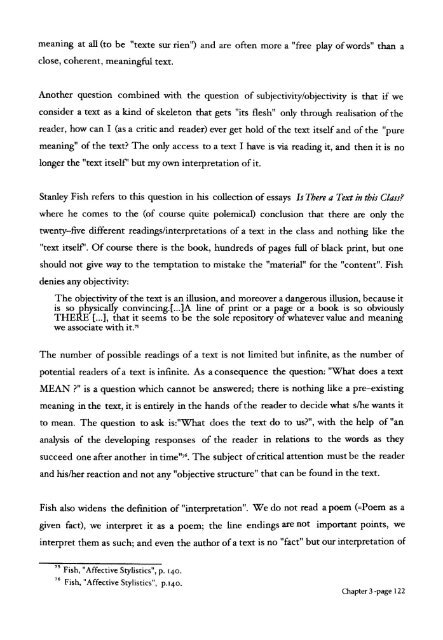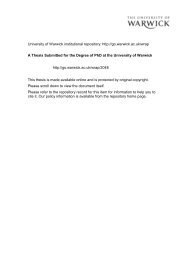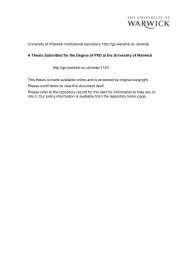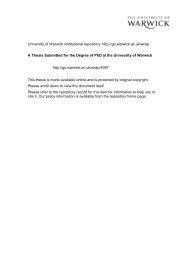From Page to Screen - WRAP: Warwick Research Archive Portal ...
From Page to Screen - WRAP: Warwick Research Archive Portal ...
From Page to Screen - WRAP: Warwick Research Archive Portal ...
You also want an ePaper? Increase the reach of your titles
YUMPU automatically turns print PDFs into web optimized ePapers that Google loves.
meaning at all (<strong>to</strong> be "texte sur rien") and are often more a "free play ofwords" than a<br />
close, coherent, meaningful text.<br />
Another question combined with the question of subjectivity/objectivity is that if we<br />
consider a text as a kind of skele<strong>to</strong>n that gets "its flesh" only through realisation ofthe<br />
reader, how can I (as a critic and reader) ever get hold of the text itself and of the "pure<br />
meaning" of the text? The only access <strong>to</strong> a text I have is via reading it, and then it is no<br />
longer the "text itself' but my own interpretation ofit.<br />
Stanley Fish refers <strong>to</strong> this question in his collection of essays Is There a Text in this Class?<br />
where he comes <strong>to</strong> the (of course quite polemical) conclusion that there are only the<br />
twenty-five different readings/interpretations of a text in the class and nothing like the<br />
"text itself'. Of course there is the book, hundreds of pages full of black print, but one<br />
should not give way <strong>to</strong> the temptation <strong>to</strong> mistake the "material" for the "content". Fish<br />
denies any objectivity:<br />
The objectivity ofthe text is an illusion, and moreover a dangerous illusion, because it<br />
is so physically convincing.{...}A line of print or a page or a book is so obviously<br />
THERE {...}, that it seems <strong>to</strong> be the sole reposi<strong>to</strong>ry ofwhatever value and meaning<br />
we associate with it,75<br />
The number of possible readings of a text is not limited but infinite, as the number of<br />
potential readers ofa text is infinite. As a consequence the question: "What does a text<br />
MEAN ?" is a question which cannot be answered; there is nothing like a pre-existing<br />
meaning in the text, it is entirely in the hands ofthe reader <strong>to</strong> decide what s/he wants it<br />
<strong>to</strong> mean. The question <strong>to</strong> ask is:"What does the text do <strong>to</strong> us?", with the help of "an<br />
analysis of the developing responses of the reader in relations <strong>to</strong> the words as they<br />
succeed one after another in time">', The subject ofcritical attention must be the reader<br />
and hislher reaction and not any "objective structure" that can be found in the text.<br />
Fish also widens the definition of "interpretation". We do not read a poem (=Poem as a<br />
given fact), we interpret it as a poem; the line endings are not important points, we<br />
interpret them as such; and even the author ofa text is no "fact" but our interpretation of<br />
75 Fish, "Affective Stylistics", p. 140.<br />
76 Fish, "Affective Stylistics", P.140.<br />
Chapter 3 -page 122





